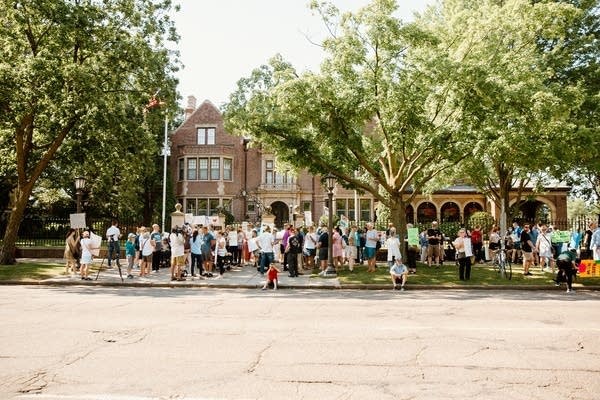Group Home Closures
August 01, 2022
Group home closures put many disabled Minnesotans at risk, advocates say

Sarah Gelbard
June 28, 2022 4:00 AM
Group home residents, staff, and family members gathered at the governor's residence Friday, calling for more state funding for disability services.
Courtesy of Erin VonRuden
Share
Minnesotans with a range of disabilities face a worrisome future as a wave of group home closures hits the state, driven by staff shortages and low wages for direct support professionals, advocates say.
More than 170 group homes across Minnesota have closed since the fall, said Sarah Abbott, a director at ACR Homes, which serves residents who need wheelchair-accessible housing and individualized medical care.
That’s more than 4 percent of the state’s group homes closing in less than a year, according to ARRM, a Minnesota nonprofit that represents home and community-based service providers.
Abbott joined staff, parents, family members and disabled residents at a rally Friday outside the governor's residence in St. Paul to get their concerns in front of Gov. Tim Walz and press for a special session for more funding.
“When we’re asking people to sign up to do physical labor working in challenging health care environments, and at a wage that is less than what you can get working at a fast food restaurant, at some point — we have to stop kidding ourselves,” said Kevin Zabel, communications director at ARRM.
He said for direct support professionals, the state and federal government reimburses through Medicare and Medicaid at roughly $14 an hour. Some organizations that oversee group home care can supplement those wages through charitable foundations or additional revenue, and others do not, he added.
At the legislative session that ended in May, lawmakers failed to agree on a proposal that could add about $250 million to the state disability budget, with some of those funds intended to increase wages for direct support professionals.
“Nothing — nothing — came through for disability services, which was very frustrating for residential providers, because legislators know of the really, really scary situation our industry is in right now,” Zabel said.
In the meantime, when homes close down, residents have to move into large facilities temporarily, or stay with aging parents who might not be able to quit their jobs and provide all necessary care. Advocates worry residents will be left without safe alternatives.
Attendees at Friday’s rally held signs reading “Where will I live?”, “Better pay for our hardworking staff!” and “Don’t make the disabled homeless.”
Sarah Christensen, a group home resident, holds a sign that reads, "Don't make the disabled homeless." She attended a rally on Friday at the governor's residence, calling for more state funding for disability services.
Sarah Gelbard | MPR News
“The reason why you have to stop and take a look at these wheelchairs is they have one-to-one medical needs,” said Sarah Christensen, a group home resident who came to the rally with her mother, Ann. “Some of them have [feeding] tubes. Some of them have [tracheostomies].”
A few years ago at Christensen’s house, there were two staff members assigned to four residents living together. Then, there was only one staff member to assist all four residents. Many group homes are set up like this, with four residents sharing small, community-oriented spaces. Christensen’s house has closed down, and she’s moved to a large assisted living facility.
It isn’t home, and there still isn’t enough staff to help residents like Sarah with community outings, said Melisa Stuckmayer, an ACR Homes nurse.
“We’ve really had to cut back to bare bones staffing. It’s just unfortunate for everyone.”
Stuckmayer said it’s difficult to spend so much time training direct support professionals only to lose them because wages are low.
“As a woman with disabilities, I see firsthand how critical this situation is,” said Shaina Briscoe.
Like Sarah, she’s in her 30s. She said she was injured in a car accident while riding her bike. She has been staying at a facility temporarily, but she wants to go home.
Briscoe said without enough support staff, that can’t happen.

|

